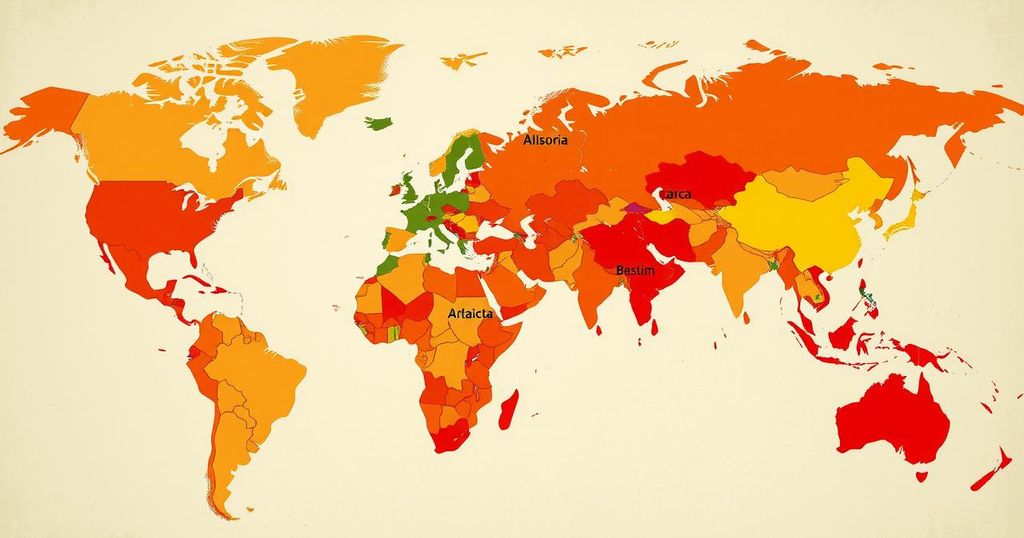The U.S. Department of State issued Level 4 “Do Not Travel” advisories for several countries, including Russia, Jamaica, and Venezuela, due to rising risks from crime and political instability. The updated warnings reflect serious safety concerns, especially as spring break approaches, urging travelers to carefully reconsider plans and prioritize their safety in high-risk areas. The travel industry may see significant adjustments in response to these developments.
The U.S. Department of State has reissued travel advisories for numerous countries including Russia, Jamaica, Colombia, and several others, designating them under Level 4 “Do Not Travel” status. This decision stems from heightened concerns about crime, political instability, and ongoing conflicts that significantly endanger travelers. As the spring break season draws near, these warnings highlight increasing risks associated with visiting these popular destinations.
Although many of these locations have historically drawn American tourists for their cultural offerings and scenic beauty, recent advisories indicate a serious shift in traveler safety perceptions. The rise in violent crime incidents, such as armed robberies and kidnappings, particularly in key tourist areas has prompted the U.S. government to recommend vigilant safety practices for American citizens.
The advisory system features four levels, with Level 4 being the most severe, indicating a high risk to American citizens. Countries are evaluated based on various factors including conflict intensity, political instability, and infrastructure adequacy. The latest advisories illustrate the U.S. response to deteriorating conditions in regions worldwide.
As of early 2025, countries including Afghanistan, Democratic Republic of the Congo, and Venezuela are listed under Level 4 advisories due to severe safety concerns. In Afghanistan, ongoing conflicts and terrorism pose significant risks, not just to tourists but to locals as well. The Congolese regions are plagued by militia violence, and in Venezuela, political turmoil has led to rampant crime and social instability.
Lebanon faces a climate of political unrest, while the Central African Republic endures persistent armed conflict, jeopardizing traveler safety. Other nations like Belarus and Iraq continue to present high risks with political suppression and extremist group activity.
Traveling to these regions often comes with dangers such as kidnappings and terrorism, prompting the State Department to issue travel restrictions. U.S. citizens are advised to avoid these high-risk countries until safety conditions improve.
For individuals considering travel to such high-risk areas, adherence to strict safety measures is essential. This includes consulting the U.S. State Department’s travel advisory updates, joining the Smart Traveler Enrollment Program, and acquiring substantial travel insurance. By remaining informed and cautious, travelers can better navigate these precarious environments.
The ramifications of these advisories on the travel industry are profound. Travel agencies and airlines will need to adjust their offerings based on these evolving safety landscapes. Increased demand for travel insurance covering emergencies and other significant services signifies how travel trends are shifting in light of safety concerns.
In summary, as the spring break period approaches, the heightened risks alert American travelers to reconsider their plans for several destinations plagued by violence and instability. The significant issuance of Level 3 and Level 4 advisories underscores the pressing need for travelers to prioritize safety and adapt their travel plans accordingly. Vigilance and informed decision-making will remain crucial in ensuring enjoyable travel experiences during tumultuous times.
In conclusion, the U.S. Department of State’s updated Level 4 travel advisories serve as a critical warning for American travelers planning trips to various nations experiencing heightened security challenges. These advisories are essential for ensuring the safety of U.S. citizens, urging travelers to reconsider their itineraries. The travel industry will need to respond dynamically to these challenges, significantly influencing traveler behaviors and expectations during the upcoming spring break season.
Original Source: www.travelandtourworld.com






